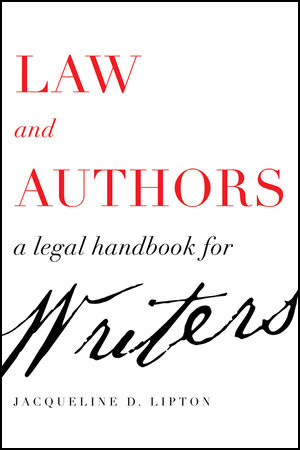
Authors Alliance is grateful to Jacqui Lipton for this guest post on implied licenses. Her new book, Law and Authors: A Legal Handbook for Writers, is an approachable, reader-friendly resource to help authors navigate the legal landscape of the contemporary publishing industry. Through case studies and hypothetical examples, Law and Authors addresses issues of copyright law, including explanations of fair use and the public domain; trademark and branding concerns for those embarking on a publishing career; laws that impact the ways that authors might use social media and marketing promotions; and privacy and defamation questions that writers may face. Get your copy today from the University of California Press (use discount code 17M6662 for 30% off).
* * *
Authors deal with copyright issues all the time, both in relation to their own, and other people’s, work: for example, if an author wants to use someone else’s photography or graphic to illustrate a point made in a book, or use a line of a poem or song as a chapter epigraph. Usually, a publisher will ask the author to obtain permission for these uses. In the absence of permission, or in the absence of a traditional publisher seeking permission (e.g., in the self-publishing context), the go-to defense for unauthorized use, if a problem arises, is typically fair use.
This blog post is about another defense to copyright infringement that can arise where an author thinks she has permission to use copyrighted material in the absence of a clear contract, based on surrounding facts. Enter the implied license doctrine. While it can be difficult to succeed with this defense, it’s worth knowing about.
Implied licenses in the copyright context are an outgrowth of basic contract law principles where agreements are sometimes implied between two or more people in circumstances where a judge or jury believes that those people would have made a contract if they’d turned their minds to it. The typical example given in law school classrooms involves lawn mowing: Assume you mow your neighbor’s lawn every Sunday for three weeks, and she gives you $20 each time. Then you mow her lawn the next week and she refuses to pay. Do you have a contract? A contract would probably be implied here based on the way you both acted. Your neighbor would likely have to pay you the $20 for the fourth week.
Copyright law has adopted a similar approach in terms of licenses to use a copyright work if it seems like the parties would have created a license under the circumstances. An implied license, if it exists, must, by definition, be non-exclusive because U.S. copyright law requires exclusive licenses to be in writing.
Courts have differed in the tests they use for implying a copyright license. Some courts use a three-step test that largely developed out of situations where the parties had an express agreement in place, but deviated from its terms in practice: for example, where a contract requires invoices to be generated and payments to be made prior to engaging in a licensed use, but the parties have engaged in a course of dealing that allows invoices and payments to post-date uses (e.g., publication) of licensed works.
In these kinds of cases, many courts have asked whether the copyright holder: (1) creates a work at another person’s request; (2) delivers the work to the other person; and, (3) intends the other person to copy and distribute the work. If the answer to all of these questions is “yes”, a license will likely be implied.
For example, in Latimer v Roaring Toyz, 601 F.3d 1224 (2010) a freelance photographer (Latimer) was hired by Kawasaki to photograph some tricked-out Kawasaki motorbikes for promotional materials connected to a bike show. The pictures were later used for promotions in Cycle World magazine articles and on Roaring Toyz’s website. Kawasaki and Roaring Toyz argued that there was an implied license to use the photos in all of these contexts. The court held that there was an implied license for Roaring Toyz to use the photographs for the bike show, but not for any other purposes. (The license had to be implied here because the original contract was with Kawasaki, not Roaring Toyz.)
Applying the three-step test, the court noted that: (1) Latimer took the photos at Kawasaki’s request; and, (2) he delivered the photographs to Kawasaki and Roaring Toyz; (3) for use at the show. This was enough evidence to support an implied license to use the photos at the show. However, the license didn’t cover the additional uses on Roaring Toyz’s websites or in the Cycle World magazine.
Not all courts rely on the three-step test for implied licenses. Some take a much more wholistic view of whether an implied license has been established. In Pelaez v McGraw Hill, 399 F. Supp. 3d 120 (2019), another case involving arguments about unauthorized uses of photography, the court noted that the correct legal test for an implied license is whether the parties conduct, taken as a whole, supports the intent to grant a license. This approach, taken in many cases, is more like the standard common law approach to implying any kind of contractual obligation to unclear facts.
In Pelaez, Judge Wood emphasized the fact that a license cannot be imposed on the basis of the unilateral expectations of one party. It is not enough for a person to subjectively believe there was a license; there must be actual facts from which the court could infer that both parties intended a license, or would have intended a license if they had turned their minds to it. If an author or other creative artist makes it clear, say, on their website that they do not consent to unauthorized use of their material (e.g., many authors say they “do not allow fanfiction”), it’s unlikely a court would imply a license in relation to the relevant works.
Because of the challenges in constructing implied licenses out of often ambiguous facts, if you want to re-purpose someone else’s work in your own manuscript, it’s a better idea to either obtain permission or to see if you raise a good fair use argument. More information on fair use is available here.
Of course, a court can always “get it wrong” when working by implication, which is why it’s always better to specifically say clearly what uses are, and are not, allowed, under a written contract. Even if you post your work online, express license terms are easier to create than ever before. Creative Commons licenses enable authors and others to release work online with clear license terms attached. Stock photography websites, for example, do a very good job of clearly setting out the licensing terms for images released via their services. Terms can include both money and attribution, as well as restrictions on future commercial uses. Further information on Creative Commons licenses is available here.

Jacqui Lipton is the founder of Raven Quill Literary Agency as well as a consultant on business and legal issues for creative artists. She also teaches law and legal writing at the University of Pittsburgh, as well as several online venues. She writes regular columns on legal and business issues for authors for SCBWI, Luna Station Quarterly, Catapult, and Savvy Authors. Her book Law and Authors: A Legal Handbook for Writers is available from University of California Press.
Discover more from Authors Alliance
Subscribe to get the latest posts sent to your email.
